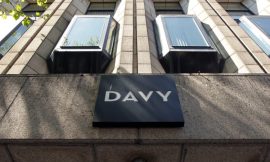New rules came into force yesterday requiring makers of artificial intelligence (AI) models to ensure their systems are safe and transparent.
The latest phase of the EU’s AI Act also means the Government must put structures in place to police the companies providing AI tools.
Europe’s regulation of AI comes as the US vows to cut red tape for the sector.
At the offices of digital agency All human in Dublin, developers are working on a new project for a client – an AI-driven energy price comparison tool.
Advances in technology mean the AI chatbot being used in the project has an Irish accent and sounds human.
The new AI rules mean it must be made clear to consumers if a realistic voice they are engaging with is in fact an AI chatbot.

“With the sophistication of AI, things like artificial voices can be so nuanced that they can convince you it’s human,” John Mitchell, CEO of All human, said,
“As a consequence of the AI Act, organisations, brands and providers of services, particularly in a digital context, have to declare what is real and what is not,” Mr Mitchell said.
The EU AI Act came into force last year and is being implemented on a phased basis with its latest provisions taking effect yesterday.
The Act bans artificial intelligence systems considered a clear threat to the safety, livelihoods and rights of people.
There are also rules for AI systems in terms of transparency and safety.
Maureen Daly, a partner specialising in Intellectual Property and AI at law firm Pinsent Masons Ireland, said businesses “need to start making their preparations now”.
“Obviously it relates to the big players like Google and Meta, but also to start-ups and SMEs that have AI systems, they are going to have to comply as well,” she said.

And there are big fines for companies found to be in breach of the AI rules.
“The European Commission has said because they don’t have the relevant powers they won’t start fining people until 2 August 2026 but that doesn’t mean you can just sit on your laurels until then because all of this is going to take time and resources,” Ms Daly said.
“The fines are quite large, 3% of annual turnover or €15 million if you don’t comply,” she added.
The AI rules that came into force yesterday require EU Member States to prepare for the policing of the Act.
It means the Government must designate competent authorities and legislate for penalties for infringements.

Dr Kris Shrishak, a senior fellow with the Irish Council for Civil Liberties (ICCL), said he believes the Government has not done enough to prepare for the AI new rules.
“They should have started this process much, much earlier,” Dr Shrishak said.
“There needs to be an urgency from the Government not only to set up the required governance mechanism for the regulators, but also to provide the resources so that regulators can do their jobs,” he added.
Dr Shrishak said part of that involves “setting up of sandboxes to help and guide Irish companies, so it’s not just about stopping bad AI, it’s also about promoting the good uses of AI”.
“I think the State needs to accelerate what it is doing,” he added.
The Department of Enterprise said Ireland has met all of its obligations under the act to date and will continue to do so.
“A significant body of work is ongoing to support the designated authorities in preparing for implementation of the Act, including workshops, working groups and facilitated dialogue with the commission and counterparts in other Member States,” a Department spokesperson said.
“Resourcing is managed through the estimates process,” they added.
We need your consent to load this rte-player contentWe use rte-player to manage extra content that can set cookies on your device and collect data about your activity. Please review their details and accept them to load the content.Manage Preferences
Trump vows to ‘win the AI race’
But while Ireland presses ahead with EU regulation, a very different stance is being taken in the US where President Donald Trump has vowed to cut red tape to ensure America “wins the AI race”.
But is there a danger that regulation will see Ireland, and the EU, fall behind when it comes to innovation?
Caroline Dunlea, Chairperson of Digital Business Ireland (DBI), believes it is now on member states and the EU to allow the European AI space to grow and evolve.
“Bridging the competitiveness gap between ourselves and the likes of the US and China in AI is essential, if we are to stay ahead of the curve in the digital sector and its emerging technologies,” Ms Dunlea said.
“DBI believes that a balanced attitude to enforcing the Act must be taken to avoid overregulation of the AI space,” she added.
All human CEO John Mitchell agrees that a balanced approach is key.
“I think there needs to be guardrails,” Mr Mitchell said.
“I think the EU has got the balance right with a combination of being progressive but also being protective.”
“In the long term, that is the way to go with AI because it is very unregulated today,” he added.
A radio report on the new AI rules will feature on This Week on RTE Radio 1 at 1pm.




